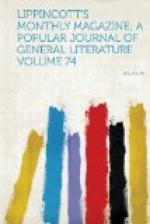Robertson waits for the others to speak, and there is a short pause before the old chief breaks the silence. Then, extending his hand to Robertson, he says, “Our white brother is welcome. We have eaten of his venison and drunk of his fire-water. He is welcome. Let him speak. Oconostota will listen.”
The white man returns cordially the grasp of the Indian; and then, still standing, while all about him seat themselves on the ground, he makes known the object of his coming. I regret I cannot give here his exact answer, for all who read this would wish to know the very words he used on this momentous occasion. No doubt they were, like all he said, terse, pithy, and in such scriptural phrase as was with him so habitual. I know only the substance of what he said, and it was as follows: that the young brave had been killed by one not belonging to the Watauga community; that the murderer had fled, but when apprehended would be dealt with as his crime deserved; and he added that he and his companion-settlers had come into the country desiring to live in peace with all men, but more especially with their near neighbors the brave Cherokees, with whom they should always endeavor to cultivate relations of friendliness and good-fellowship.
The Indians heard him at first with silent gravity, but, as he went on, their feelings warmed to him, and found vent in a few expressive “Ughs!” and when he closed, the old Archimagus rose, and, turning to the chiefs, said, “What our white brother says is like the truth. What say my brothers? are not his words good?”
The response was, “They are good.”
A general hand-shaking followed; and then they all pressed Robertson to remain with them and partake of their hospitality. Though extremely anxious to return at once with the peaceful tidings, he did so, and thus converted possible enemies into positive friends; and the friendship thus formed was not broken till the outbreak of the Revolution.
While Robertson had been away, Sevier had not been idle. He had put Watauga into the best possible state of defence. With the surprising energy that was characteristic of him, he had built a fort and gathered every white settler into it or safe within range of its muskets. His force was not a hundred strong; but if Robertson had been safely out of the savage hold, he might have enjoyed a visit from Oconostota and his twelve hundred Ottari warriors.
The fort was planned by Sevier, who had no military training except such as he had received under his patron and friend Lord Dunmore. Though rude and hastily built, it was a model of military architecture, and in the construction of it Sevier displayed such a genius for war as readily accounts for his subsequent achievements.




